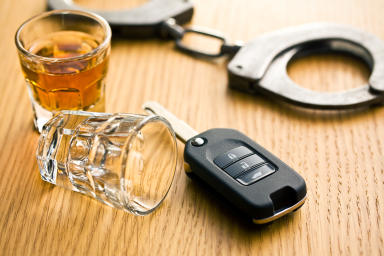Florida DUI Laws

Florida takes drunk driving very seriously, and drivers should take the time to understand the state’s DUI laws to protect themselves while on the road and know what to do if an impaired driver hits them.
According to the Florida Department of Highway Safety and Motor Vehicles (FLHSMV), over 5,000 drunk driving accidents in 2022 alone resulted in 290 fatalities and over 2,800 injuries. This doesn’t take into account accidents that involved drugs other than alcohol.
If you are facing a DUI charge or considering filing a personal injury lawsuit against a drunk driver in Florida, it is important to understand the state's specific laws and regulations.
Here’s an overview of Florida's DUI laws, penalties, dram shop liability insurance requirements, the statute of limitations for personal injury lawsuits, and several resources to help individuals who have been injured by an impaired driver.
Legal Limit for a DUI in Florida
In Florida, it is illegal to operate a motor vehicle with a blood alcohol concentration (BAC) of .08% or higher. The legal limit for drivers under the age of 21 is .02%, and for commercial drivers, it is .04%. However, it is important to note that you can still be arrested for DUI even if your BAC is below the legal limit if the officer determines that you are impaired.
Florida also has a zero-tolerance policy for drivers under the age of 21. If a driver under the age of 21 is pulled over and has a BAC of .02% or higher, their license will be immediately suspended for six months.
It is also worth noting that Florida has recently legalized the use of medical marijuana. However, it is still illegal to operate a vehicle while under the influence of marijuana or any other controlled substance.
Implied Consent in Florida
Florida has an "implied consent" law, meaning that if you are pulled over for suspicion of DUI and refuse to take a breath, blood, or urine test, your license will automatically be suspended for one year. The length of the suspension increases for repeat offenders.
Refusing to take a chemical test after being arrested for DUI can also be used against you in court as evidence of guilt. This is because under Florida law when you apply for a driver's license, you agree to submit to a chemical test if you are pulled over for suspicion of DUI. The implied consent law ensures that those who drive on Florida roads do so safely and responsibly and are held accountable for any violation of the state's DUI laws.
Drivers should also keep in mind that they may still be charged with DUI based on other evidence, even if they refuse a test.
If your license is suspended under Florida's implied consent law, you may be able to challenge the suspension by requesting an administrative hearing within ten days of your arrest. During the hearing, you can present evidence and argue that your license should not be suspended. It's important to consult with a DUI defense attorney with experience with these types of hearings to ensure you have the best chance of success.
DUI Restricted Licenses
If a driver has their driver’s license revoked due to a DUI, they may be able to apply for a restricted license.
A restricted license limits where a person can drive and may be granted to drivers who need to drive for work or another acceptable reason. Drivers with a restricted license must use an Ignition Interlock Device (IID) and be enrolled in a DUI education or substance abuse program.
However, section 316.193, Florida Statutes, prohibits drivers from hardship reinstatement if they have been convicted of a DUI two or more times or if they have had their licenses suspended two or more times for test refusal.
Aggravated DUIs in Florida
In Florida, there is a difference between a standard DUI and an aggravated DUI.
Aggravated DUIs include DUIs that involve having a minor as a passenger or having a BAC of .15% or greater.
Aggravated DUIs carry more severe penalties, including more jail time, higher fines, and the use of an IID for first offenses.
DUI Probation
In Florida, all individuals convicted of DUI must fulfill a term of monthly-reporting probation and attend a substance abuse course.
Inpatient rehabilitation can count toward jail time, and failing to complete the substance abuse course or any other required treatment can lead to the revocation of the offender's driver's license. DUI offenders may also be ordered to participate in a sobriety and drug monitoring program, which may involve random testing.
Underage DUI Laws in Florida
In Florida, any person under the age of 21 is subject to the state’s underage DUI laws if they are driving with a BAC of .02% or more.
Underage DUIs are not criminal offenses; however, they will result in the driver’s license being suspended for six months for a first offense and one year for a second offense.
Plea Bargaining
Florida allows first-time DUI offenders to plea down to “wet reckless,” which is a lesser offense. This requires the offender to plead guilty to reckless driving and acknowledge the role of alcohol or drugs in their offense.
However, this plea is not available to repeat DUI offenders, individuals whose DUI charges involve manslaughter, or offenders with a BAC of .15% or higher.
Conditions for Release after DUI Arrest in Florida
According to the Florida Department of Highway Safety and Motor Vehicles, a person arrested for a DUI is eligible for release if:
The driver is no longer under the influence
The person has regained control of their normal faculties
The person’s BAC is 0.05% or lower, or eight hours have passed since the time of the arrest
A person arrested for a DUI will remain in detention until they meet these conditions for release.
Vehicle Impoundment
After a DUI in Florida, the defendant’s vehicle will be impounded or immobilized unless their family has no other means of transportation.
A first DUI offense results in a 10-day vehicle impoundment, a second within five years of a prior conviction results in 30 days, and a third offense within ten years of a prior conviction results in a 90-day impoundment.
According to the FLHSMV, impoundment or immobilization cannot occur during the offender’s incarceration. Courts can also dismiss impoundment orders if the vehicle is operated solely by employees of the offender.
What Are the Penalties for a DUI in Florida?
The penalties for a DUI in Florida can be severe. The exact penalties you may face will depend on a variety of factors, including your BAC, any prior convictions, and whether anyone was injured or killed as a result of your DUI.
Here are some of the possible penalties for a first-time DUI offense in Florida:
A fine of $500 to $1,000 (up to $2,000 for aggravated DUIs)
Up to six months in jail (or nine months if aggravated)
A license suspension of six months to one year
Community service
Mandatory attendance at a DUI school
IID installation for six months
The penalties for subsequent DUI offenses are even more severe. You may face fines of up to $5,000, up to five years in prison, and a license suspension of up to 10 years.
It’s important to note that the first and second DUI offenses are typically misdemeanors. However, a third offense will result in a felony if the driver has prior DUI convictions within the last ten years. However, a third offense with no priors in the past ten years is still a misdemeanor in Florida.
Florida Dram Shop Liability Insurance Requirements
Most states have dram shop liability statutes that allow victims of drunk driving accidents to sue establishments that serve alcohol to intoxicated individuals. This is meant to hold establishments accountable for over-serving patrons, which can lead to accidents.
Florida’s dram shop liability statutes are not very strict, and in most cases, victims of drunk driving accidents cannot sue the establishment that served the at-fault driver. However, establishments may be liable if they serve alcohol to a minor or a “habitually addicted” person.
Bars, restaurants, and other establishments that serve alcohol are not required to carry dram shop liability insurance in Florida.
How Much Can Someone Sue For a Drunk Driving Injury in Florida?
In Florida, the amount that someone can sue for a drunk driving injury varies depending on the circumstances of the case. Generally, two types of damages can be awarded in a personal injury lawsuit: compensatory damages and punitive damages.
Compensatory damages are intended to compensate the victim for their losses, including medical expenses, lost wages, and pain and suffering. In Florida, there is no cap on compensatory damages for personal injury lawsuits, which means that victims can potentially recover a significant amount of money if they can prove that they were injured by a drunk driver.
Punitive damages are intended to punish the at-fault party for their actions and deter others from engaging in similar conduct in the future. Florida has a cap on punitive damages in personal injury lawsuits. Punitive damages cannot exceed three times the amount of compensatory damages or $500,000, whichever is greater.
The total amount you may be eligible to receive in a personal injury lawsuit will depend on your ability to demonstrate the extent of your damages.
The Statute of Limitations in Florida
The statute of limitations in Florida for personal injury lawsuits is four years from the date of the accident. This means that individuals injured in a drunk driving accident have four years from the accident date to file a lawsuit against the at-fault party. If a lawsuit is not filed within the statute of limitations, the victim may lose their right to sue.
It's important to note that there are some exceptions to the statute of limitations. For example, if the victim was a minor at the time of the accident, the statute of limitations may be extended until they reach the age of 18. The statute of limitations may also be extended if the victim was mentally incapacitated at the time of the accident.
Resources for Folks Injured by an Impaired Driver in Florida
Victims of drunk driving accidents often experience severe injuries that require costly treatments, have extensive recovery times, and lead to emotional distress. It’s important for victims to know what steps to take to get compensation and maintain financial stability while they recover.
If you've been injured by an impaired driver in Florida, there are several resources available to you. Here are a few to consider:
Mothers Against Drunk Driving (MADD) Florida
MADD is a non-profit organization that provides support to victims of drunk driving and works to raise awareness about the dangers of drunk driving. They offer a variety of services, including victim advocacy, support groups, and educational programs.
MADD can help you prepare a victim impact statement, accompany you to court for emotional support, help you find a lawyer, and connect you with other victims who share similar experiences.
Visit: madd.org/florida
Florida Department of Highway Safety and Motor Vehicles
The Florida Department of Highway Safety and Motor Vehicles is responsible for overseeing driver's licenses, vehicle registrations, and other safety-related issues. They offer a variety of resources for victims of drunk driving, including information on victim services and victim compensation.
The FLHSMV also offers information about DUI laws in the state, which can be helpful for victims planning to file a lawsuit.
Visit: flhsmv.gov
Drive Sober Florida
Drive Sober Florida is designed to provide educational resources to drivers and visitors in Florida. Individuals can visit their website to find drunk driving statistics, information about DUI laws in Florida, and information about Florida’s impaired driving strategic plan.
Visit: drivesoberfl.com
Expertise.com StaffAuthor
Step into the world of Expertise.com, your go-to hub for credible insights. We don't take accuracy lightly around here. Our squad of expert reviewers, each a maestro in their field, has given the green light to every single article you'll find. From rigorous fact-checking to meticulous evaluations of service providers, we've got it all covered. So feel free to dive in and explore. The information you'll uncover has been stamped with the seal of approval by our top-notch experts.




